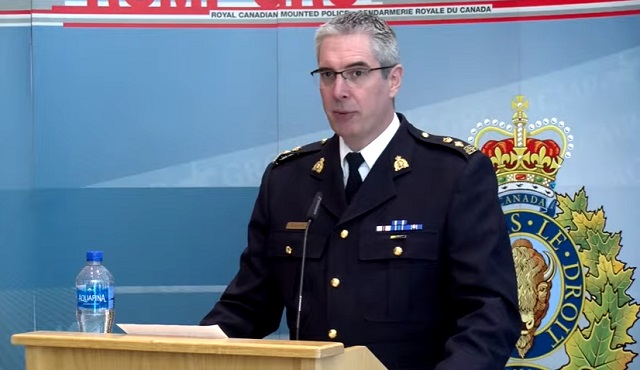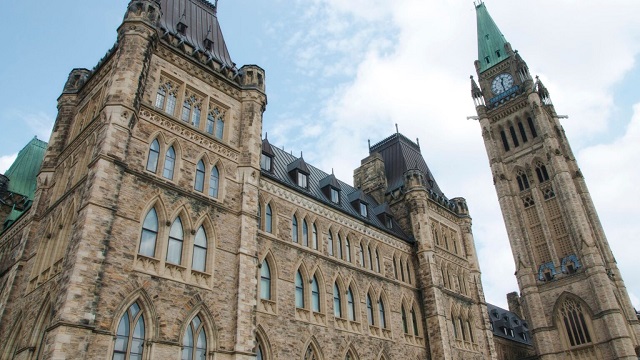Alberta
Alberta RCMP announce results of investigation into the 2017 UCP Leadership Vote

News release from the Alberta RCMP
Alberta RCMP concludes investigations surrounding the 2017 UCP Leadership Vote
In July 2017, the Wildrose Party and the Progressive Conservative Party merged to form the United Conservative Party (UCP). A UCP leadership contest followed, which was an internal UCP process with no oversight from Elections Alberta, except as it related to the Alberta Election Finances and Contributions Disclosure Act (EFCDA).
On Oct. 4, 2017, Jeff Callaway dropped out of the race and publicly endorsed Jason Kenney. On Oct. 28, 2017, Kenney was officially elected as the new UCP leader. Allegations of wrongdoing surfaced after the leadership contest. In February 2019, a complaint was received by the Alberta RCMP in relation to these allegations, which resulted in the RCMP opening an investigation into two separate allegations.
Allegation #1 – Jeff Callaway candidacy
One allegation was that Callaway entered the contest solely to attack another candidate, always with the intention of pulling out of the leadership race and endorsing a different candidate prior to the vote. Given the allegation that this candidate had portrayed himself as a legitimate candidate and, as a result, was able to solicit money from individuals who believed he was a legitimate candidate, fraud contrary to section 380 of the Criminal Code, was identified as the appropriate offence to be investigated:
- Investigators reviewed the candidate’s campaign debates and political advertisements used during the campaign. A review of the campaign’s financial records showed that, as a result, it was able to generate approximately $95,000 in financial contributions. Elections Alberta investigated Callaway’s campaign finances under the Alberta Election Finances and Contributions Disclosure Act. The results of Elections Alberta’s investigation are posted on their website.
- Alberta RCMP Investigators conducted more than 170 interviews with contributors and campaign staff, and examined over 25,000 related emails.
Outcome #1: The investigation did not uncover evidence to establish that Callaway, or any other person, committed a criminal offence.
Allegation #2 – Voter Fraud
In order to vote, a UCP member needed to register and receive a Personal Identification Number (PIN), either by phone call, email, or text message. Once the PIN was received, the member could then cast a vote by phone or by using a proprietary electronic voting platform on the internet.
The allegations were that emails were created in order to receive PINs and vote on peoples’ behalf without their consent or knowledge. Identity Fraud contrary to section 403 of the Criminal Code was identified as the appropriate offence to be investigated under the circumstances:
- The online platform used by the UCP to hold the leadership contest was identified and the RCMP obtained the voter database through a legal process, which contained data for more than 60,000 voters.
- The RCMP analysed the data and identified several suspicious cross-sections of voters where multiple votes were cast from the same phone number, or originated from the same IP address. Similar to an in-person ballot, the data did not show which candidate was voted for, only that a vote had been cast using that unique identifier.
- The RCMP generated a list of these “suspicious votes,” conducted interviews with the more than 1,200 individuals and examined their UCP membership and registration forms.
- To be clear, the number of potential votes at issue, which after investigation was less than 200, would not have impacted the leadership contest given that Jason Kenney won with 36,625 votes (61%), whereas Brian Jean received 18,336 votes (31%), followed by Doug Schweitzer with 4,273 votes (7%).The RCMP investigation did not find evidence that any leadership candidate encouraged their volunteers to engage in identity fraud.
- The service provider for the online voting platform used by the UCP was not compromised, and worked exactly as specified.
This high-profile investigation was extremely complex, and time consuming due to several factors:
- The sheer volume of data being analysed and investigated took a significant amount of time. Further, a portion of this data required that judicial authorizations be obtained both domestically and outside of Canada.
- The fact that the complaint was not received until 2019 impacted many witnesses’ recollections of the event. The 2017 UCP Leadership Contest occurred at the same time as other internal party votes. As a result, some witnesses were unclear about which process the RCMP were investigating.
- Even for cases that appear to be voter fraud, there can be innocent explanations. For example, it wasn’t illegal for one phone number or email to receive many PINs. It was also not illegal for many votes to be cast from the same IP address or phone number. In certain families living under the same roof, this was common. We also saw the same pattern in office buildings and at voting kiosks where many people voted from the same IP.
Outcome #2: While the Alberta RCMP determined that there were suspected instances of potential identity fraud, there was insufficient evidence to charge any suspect, again there was no evidence that any leadership candidate orchestrated these relatively rare instances.
The decision on whether or not to lay a charge in Alberta rests with the police. However, throughout this investigation, the RCMP did seek advice from Crown, which began in Alberta, but was later referred to the Ontario Ministry of the Attorney General who assigned Crown Prosecutors.
These Crown Prosecutors provided valuable and timely advice throughout our investigation and their assistance was greatly appreciated
It should be noted that these allegations of possible voter fraud occurred during an internal political party voting process, and in no way represents any possible fraud or shortcomings in our general provincial and federal elections.
Nothing in the investigation suggested that the UCP failed to take reasonable steps to manage their internal process. We hope that the information shared today will further reduce the risk of similar incidents occurring in the future for any political party.
The investigators received cooperation from the UCP and the leadership candidates which
assisted in moving the investigation forward.
“We would like to highlight that in investigating allegations of criminality, the thoroughness and completeness of the investigation is the standard that should be assessed and that the lack of criminal charges should not be the test of a successful investigation,” said Superintendent Rick Jané of the Alberta RCMP. “In this case, experienced criminal investigators tested these allegations. In the end, Albertans can be confident that a thorough investigation, independent of government, was conducted.”
Video of News Conference: https://www.youtube.com/@RCMPAlbertaGRC/streams
Key Statistics:
Investigators
- 65 Investigators
o 5 core investigators
o 60 additional investigators seconded for varying lengths of time
o 10 public service employees assisted in various capacities
Investigation
- 1,200 voter canvass interviews
- 563 structured interviews
o 226 hours of audio
o Conducted by two interviewers
o Totaling 420 person-hours worked
Translation
- Translation was required for Arabic, South Asian and Chinese languages
- Investigators were sourced from “K” Div Federal Policing; Auto-theft; Digital Forensic Services Units; as well as Airdrie, Canmore, Red Deer, Thorsby, High River, and Maskwacis RCMP Detachments to fulfill this need.
Financial
- $460,877 in overtime and travel expenses
o $356,288 in overtime
o $104,589 in travel expenses, with $38,647 in out-of-province expenses
Travel
- 12 out of province trips (BC, Ontario, Nova Scotia) involving 22 members
- There was no international travel
Documentation
(warrants, sealing orders, production orders, information to obtain, administration, mutual legal assistance requests)
- 7,484 PDF documents (totaling 69,922 pages)
- 20,625 digital files (totaling 54 GB of data)
Alberta
Former senior financial advisor charged with embezzling millions from Red Deer area residents

News release from Alberta RCMP
Former senior financial advisor charged for misappropriating nearly $5 million from clients
On April 4, 2024, the RCMP’s Provincial Financial Crime Team charged a Calgary resident for fraud-related offences after embezzling millions of dollars from his clients while serving as a senior financial advisor.
Following a thorough investigation, the accused is alleged to have fraudulently withdrawn funds from client accounts and deposited them into bank accounts he personally controlled. A total of sixteen victims were identified in the Red Deer area and suffered a combined loss of nearly $5 million.
Marc St. Pierre, 52, a resident of Calgary, was arrested and charged with:
- Fraud over $5,000 contrary to section 380(1)(a) of the Criminal Code; and,
- Theft over $5,000 contrary to section 344(a) of the Criminal Code.
St. Pierre is scheduled to appear in Red Deer Provincial Court on May 14, 2024.
“The ability for financial advisors to leverage their position to conduct frauds and investment scams represents a significant risk to the integrity of Alberta’s financial institutions. The investigation serves as an important reminder for all banking clients to regularly check their accounts for any suspicious activity and to report it to their bank’s fraud prevention team.”
- Sgt. John Lamming, Provincial Financial Crime Team
The Provincial Financial Crime Team is a specialized unit that conducts investigations relating to multi-jurisdictional serious fraud, investments scams and corruption.
Alberta
Political parties will be part of municipal elections in Edmonton and Calgary pilot projects

Strengthening Alberta’s local elections
Alberta’s government is introducing legislation to ensure Albertans can rely on transparent, free and fair elections, and municipally-elected officials have clearer accountability measures.
In a democratic society, Albertans expect their local elections to be free and fair, and their elected officials to be held to account by clear rules that govern their local councils. The Municipal Affairs Statutes Amendment Act proposes amendments to the Local Authorities Election Act (LAEA) and the Municipal Government Act (MGA) to add greater transparency to local election processes and ensure local councils and elected officials continue to remain accountable to the citizens who elected them.
“Our government is committed to strengthening Albertans’ trust in their local governments and the democratic process that elects local leaders. The changes we are making increase transparency for Alberta voters and provide surety their votes will be counted accurately. We know how important local democracy is to Albertans, and we will work with local authorities to protect and enhance the integrity of local elections.”
Local Authorities Election Act
Albertans expect free and fair elections and that’s why it’s important we strengthen the rules that govern local elections. To strengthen public trust in local elections, Alberta’s government will eliminate the use of electronic tabulators and other automated voting machines. All Albertans should be able to trust the methods and results of local elections; requiring all ballots to be counted by hand, clarifying rules and streamlining processes for scrutineers will provide voters greater assurance in the integrity of the results.
All eligible Albertans should be able to vote in local elections without impediment. Alberta’s government will limit the barriers for eligible voters to cast a ballot by expanding the use of special ballots. Currently, special ballots can only be requested for very specific reasons, including physical disability, absence from the municipality, or for municipal election workers. By expanding the use of special ballots, the government is encouraging more voter participation.
Amendments in the Municipal Affairs Statutes Amendment Act would increase transparency in local elections by enabling political parties at the local level. Political parties would be enabled in a pilot project for Edmonton and Calgary. The act will not require candidates to join a political party in order to run for a local or municipal office, but will create the opportunity to do so.
In addition, proposed changes to the Local Authorities Election Act would allow municipalities the option to require criminal record checks for local candidates, thus increasing transparency and trust in candidates who may go on to become elected officials.
Municipal Government Act
The role of an elected official is one with tremendous responsibility and expectations. Changes proposed to the Municipal Government Act (MGA) will strengthen the accountability of locally elected officials and councils. These include requiring mandatory orientation training for councillors, allowing elected officials to recuse themselves for real or perceived conflicts of interest without third-party review and requiring a councillor’s seat to become vacant upon disqualification.
If passed, the Municipal Affairs Statutes Amendment Act will also unlock new tools to build affordable and attainable housing across Alberta. Proposed amendments under the MGA would also create more options for municipalities to accelerate housing developments in their communities. Options include:
- Exempting non-profit, subsidized affordable housing from both municipal and education property taxes;
- Requiring municipalities to offer digital participation for public hearings about planning and development, and restricting municipalities from holding extra public hearings that are not already required by legislation; and
- Enabling municipalities to offer multi-year residential property tax exemptions.
Municipal Affairs will engage municipalities and other partners over the coming months to hear perspectives and gather feedback to help develop regulations.
Quick facts
- The LAEA establishes the framework for the conduct of elections in Alberta municipalities, school divisions, irrigation districts and Metis Settlements.
- The MGA establishes the rules governing the conduct of local elected officials once on council, as well as the overall administration and operation of municipal authorities in Alberta, including any policy those authorities may wish to implement.
Related information
-

 COVID-1910 hours ago
COVID-1910 hours agoJapanese study finds ‘significant increases’ in cancer deaths after third mRNA COVID doses
-

 Business8 hours ago
Business8 hours agoMaxime Bernier warns Canadians of Trudeau’s plan to implement WEF global tax regime
-

 Brownstone Institute6 hours ago
Brownstone Institute6 hours agoA Coup Without Firing a Shot
-

 COVID-194 hours ago
COVID-194 hours agoWHO Official Admits the Truth About Passports
-

 Bruce Dowbiggin7 hours ago
Bruce Dowbiggin7 hours agoCoyotes Ugly: The Sad Obsession Of Gary Bettman
-

 Energy2 hours ago
Energy2 hours agoAnti-LNG activists have decided that they now actually care for LNG investors after years of calling to divest
-

 Freedom Convoy5 hours ago
Freedom Convoy5 hours agoOttawa spent “excessive” $2.2 million fighting Emergencies Act challenge
-

 Frontier Centre for Public Policy9 hours ago
Frontier Centre for Public Policy9 hours agoThe tale of two teachers


